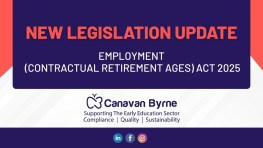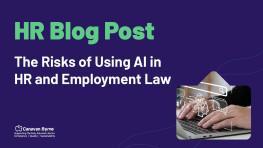
In the opening weeks of 2025 there have been 2 significant changes to employment law, with another significant change due in September. Employers and Organisations are required to adapt to and implement these updates.
National Minimum Wage Increase
On the 1st of January 2025, the National Minimum wage increased to €13.50 for employees aged 20+. This increase aligns with the Government’s plan to phase in a National Living Wage, set at 60% of hourly median pay, by 2026.
On the 1st of January 2025, the National Minimum wage increased to €13.50 for employees aged 20+. This increase aligns with the Government’s plan to phase in a National Living Wage, set at 60% of hourly median pay, by 2026.
Statutory Sick Pay (SSP)
The current entitlement is 5 days paid sick leave annually. The entitlement was expected to increase to 7 days in January 2025. However the scheme is currently under review and further expansion of the scheme depends on research and affordability for businesses.
The current entitlement is 5 days paid sick leave annually. The entitlement was expected to increase to 7 days in January 2025. However the scheme is currently under review and further expansion of the scheme depends on research and affordability for businesses.
Automatic Enrolment Retirement Savings
The Automatic Enrolment Retirement Savings System Act, signed on 9 July 2024, establishes pension auto-enrolment for employees not in an existing pension scheme. The scheme, set to launch in September 2025, will involve contributions from employees, employers, and the Government.
A Reminder About Probation
In Ireland, while the probation period allows employers to assess the suitability of a new employee, it does not grant carte blanche to terminate employment without due process. Therefore, caution is advised. The probation period is typically defined in the employment contract, and although employees on probation have fewer protections than those who have completed it, there are still legal considerations.
Risk of Unfair Dismissal Claims
Employees with less than one year of service generally cannot bring a claim for unfair dismissal under the Unfair Dismissals Acts 1977-2015. However, there are exceptions. For instance, if the dismissal is deemed discriminatory or if it breaches certain statutory rights, the employee may have grounds for a claim.
Employees with less than one year of service generally cannot bring a claim for unfair dismissal under the Unfair Dismissals Acts 1977-2015. However, there are exceptions. For instance, if the dismissal is deemed discriminatory or if it breaches certain statutory rights, the employee may have grounds for a claim.
Other Potential Claims
In addition to unfair dismissal, employees may be able to make other claims if they believe their termination was unjust. These include:
In addition to unfair dismissal, employees may be able to make other claims if they believe their termination was unjust. These include:
- Discrimination Claims
Under the Employment Equality Acts 1998-2015, employees are protected against discrimination from the outset of their employment. Terminating an employee during probation based on any of the nine discriminatory grounds (e.g. age, gender, race, religion) can result in a discrimination claim.
- Breach of Contract Claim
If an employer fails to adhere to the terms outlined in the employment contract. For example, if your contracts outline probation procedures and you don’t follow them.
- Claims under Health and Safety Legislation
Employees are entitled to a safe working environment. If an employee is terminated for raising health and safety concerns, they could potentially bring a claim under the Safety, Health, and Welfare at Work Act 2005.
- Whistleblower Protection Claims
Under the Protected Disclosures Act 2014, employees who are dismissed for making a protected disclosure (whistleblowing) can bring a claim for unfair dismissal, irrespective of their length of service.
For all your HR queries, email: reception@canavanbyrne.ie
For all your HR queries, email: reception@canavanbyrne.ie
Share this article



